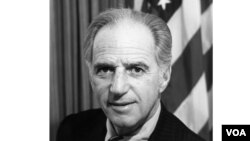R. Peter Straus was a dynamic media executive with a background in public service, campaign management, and radio broadcasting. He is credited with transforming his family’s New York City AM station WMCA into one of the country’s most pioneering: one that helped popularize rock ’n’ roll, the first to play the Beatles in December 1963, and the first to run radio editorials (read by Straus himself). In 1961, in a case that reached the Supreme Court (WMCA v. Simon), Straus and his station took on New York’s legislative apportionment system and won when the New York system was ruled unconstitutional. According to The New York Times’ obituary of Straus, WMCA retained its trailblazer reputation after Straus converted it to an all-talk format in 1970. It became the first station to call for the resignation of President Nixon for the Watergate scandal, the first to ban cigarette advertising, and the first to accept ads from abortion rights advocates and makers of contraceptives.
After graduating cum laude from Yale University in 1943, Straus flew missions over Germany as a World War II B-17 bomber pilot. He was awarded six Air Medals for meritorious achievement while participating in aerial flight. A linguist who spoke six languages (English, French, Spanish, German, Russian, and Portuguese), he stayed in Germany after the war as an official in the military occupation. He later worked for the International Labor Organization (ILO) in Geneva and the U.S. Office of the ILO, was a NY delegate to the Democratic National Conventions in 1960 and 1964, ran Robert F. Kennedy’s 1964 Senate campaign, and served as assistant administrator of the Agency for International Development (AID) in charge of African Affairs. In 1977, President Jimmy Carter appointed him director of VOA.
Straus was responsible for adding VOA news bureaus in Africa and Latin America as well as for instituting new guidelines which enhanced VOA’s journalistic role, including separating correspondents and bureaus from U.S. missions, enabling the use of commercially-leased space for bureaus rather than using space in U.S. missions.




